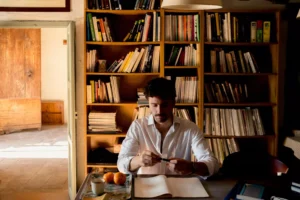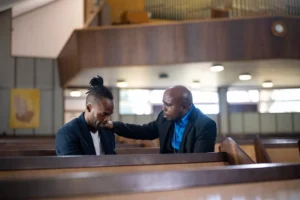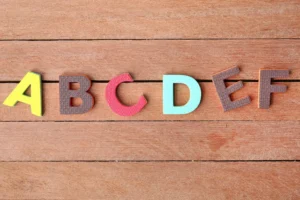Question
Answer
You raise good questions. How deeply does God really care for us? He loves us more than we can imagine. But if that’s true, then when an addicted person wants to quit, why doesn’t God help right away? Don’t those who do quit, quit of their own free will?
Sometimes the best answer to a question is another question. How do you know God doesn’t help right away? I would say that He must be helping. Addiction weakens our free will. If an addicted person is nevertheless able to quit “of his own free will” — something that would seem to be impossible — why not say instead that Christ is giving help to his free will?
You see, God gave free will to us. It’s His gift. His idea of healing us isn’t to override the gift, but to make the gift holy. He could have made us robots without free will — beings that made no real decisions, but did the right thing no matter what. Some people would like that, because then there wouldn’t be such things as addiction; we’d escape the very possibility of self-inflicted evils. Here’s the problem with that so-called solution: Without free will, we would also escape the very possibility of the greatest goods. How so? You see, God loves us, and it was His purpose to make us in His own image — like little finite copies of Himself, able to receive His love and to love Him in return. But for that, free will is crucial. No robot can love, because love, by its nature, is something freely chosen.
Do you see how this works? To be made in His image we must be capable of love; to be capable of love we must have free will; but to have free will, we must also be capable of willing wrongly. To “fix” the addicted person by destroying his already-weakened free will would be to complete his destruction. It would also make all his decisions meaningless, because they wouldn’t really be his.
Instead, in Christ, God does something much more amazing, much more profound, something which transcends our understanding. Rather than destroying our free will, He heals it.
But what about those who don’t escape their addiction? Isn’t God helping them? There are two issues here.
First, you say the person “really wants to quit.” How do you know that? When we are wrapped up in our sins, we often say to other people that we want to quit, even though we don’t really. We even try to convince ourselves of the lie. Only Christ can penetrate the veil of deceptions and self-deceptions; we can’t.
Second, although you say the person wants to quit, you don’t say that the person wants God’s help in quitting. God doesn’t often help without our asking. Often we don’t even want His help. To receive His help is to give up control, to abandon the claim to self-ownership, to admit that we are in ruins and cannot help ourselves. This is a blow to our sinful pride.
Besides, it is a fearsome thing to pass into the hands of the living God — even into His helping hands, for God’s idea of helping may be quite different from our own. Our idea of help may be merely that we escape some sin or addiction, then return to our old lives, still without Him. But His love is inexorable, and in the torrent of that love He desires goods for us which we have never thought of and which would, in our present state, make us tremble to conceive.
Third, although God will one day wipe every tear from the eyes of His redeemed, He does not promise to heal every hurt in this life. Every now and then we get glimpses of some of the reasons. Here’s what Paul wrote about one of his own afflictions.
To keep me from becoming conceited because of these surpassingly great revelations, there was given me a thorn in my flesh, a messenger of Satan, to torment me. Three times I pleaded with the Lord to take it away from me. But He said to me, “My grace is sufficient for you, for my power is made perfect in weakness.” Therefore I will boast all the more gladly about my weaknesses, so that Christ’s power may rest on me. That is why, for Christ’s sake, I delight in weaknesses, in insults, in hardships, in persecutions, in difficulties. For when I am weak, then I am strong. (2 Corinthians 12:7-10, NIV)
The triune God made us for Himself, and He will be satisfied with nothing less than our transformation: purifying and burnishing us until we reflect back His image as perfectly as the angels reflect His light. Do we want that much help, that much good, that much glory? That is the question.
Grace and peace,
PROFESSOR THEOPHILUS
Copyright 2003 Professor Theophilus. All rights reserved.









